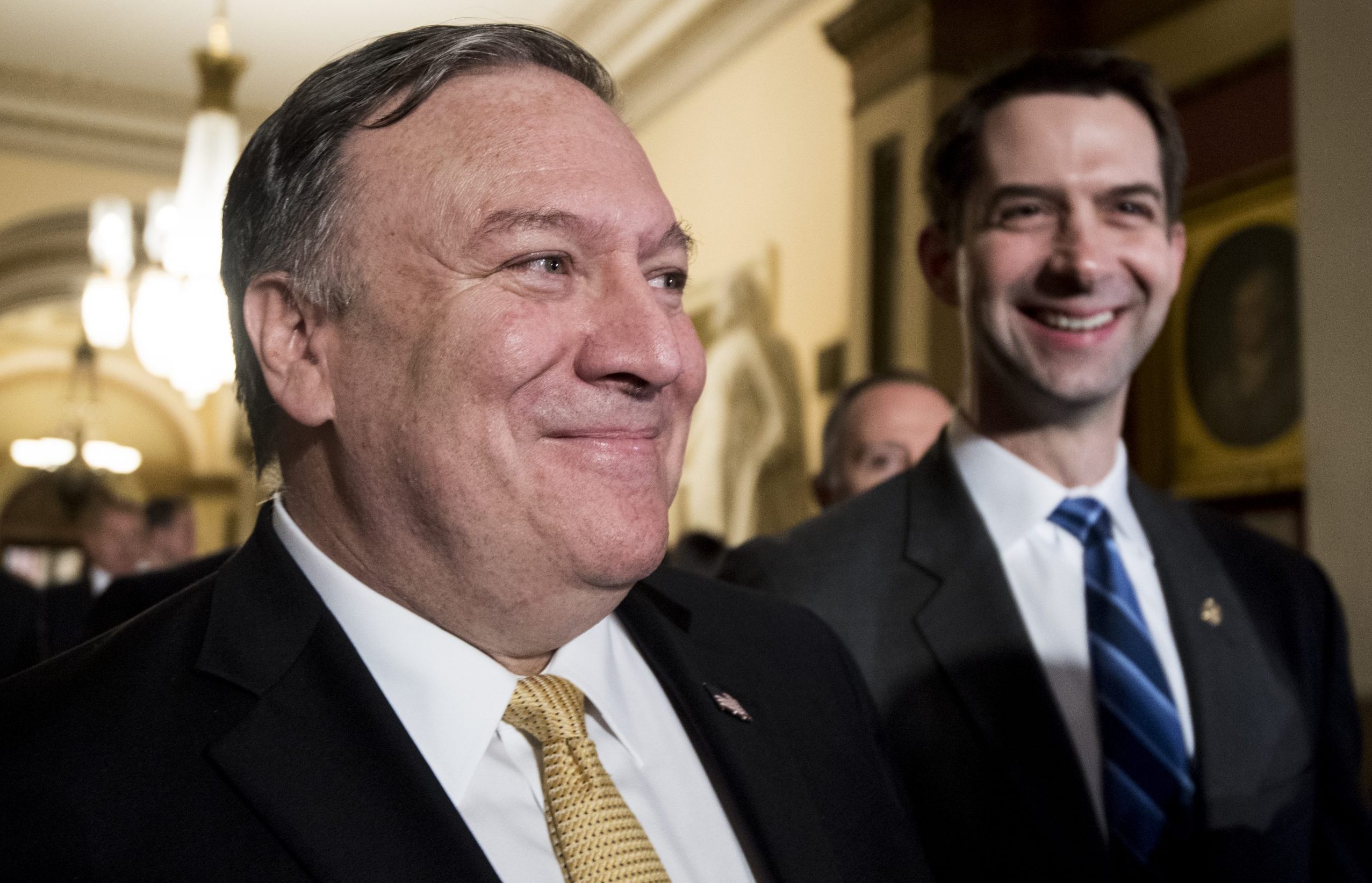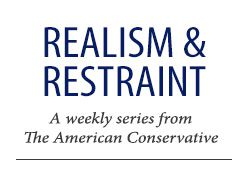Get Real: Checking China’s Power Grabs Without Bending to The Hawks

The drums of war with China are beating loud within the Trump administration this summer, as several senior members of the Trump administration called out the “threat” that China poses to America in high-profile speeches this summer, predicting dire consequences for America if the U.S. continues to ignore China and the Chinese Communist Party (CCP.)
Speaking outside the Nixon Library, Secretary of State Mike Pompeo lambasted the “Chinese Communist Party’s designs for hegemony” and declared a new Cold War; national security adviser Robert O’Brien’s excoriated the “Chinese Communist Party’s ideology and global ambitions;” at the Hudson Institute, FBI Director Christopher Wray said China is a “threat to our economic security—and by extension, to our national security;” at the Gerald R. Ford Presidential Museum, Attorney General William Barr said, “the ultimate ambition of China’s rulers isn’t to trade with the United States. It is to raid the United States.”
Each Trump official seemed determined to outdo the others with harsher and more inflammatory rhetoric. All four speeches emphasized what the Trump administration deems the global nature of the threat China poses, laid out lists of China’s crimes, and urged a warlike change of course.
“If the free world doesn’t change … communist China will surely change us. There can’t be a return to the past practices because they’re comfortable or because they’re convenient,” Pompeo concluded. “Securing our freedoms from the Chinese Communist Party is the mission of our time, and America is perfectly positioned to lead it because our founding principles give us that opportunity.”
The four speeches mirrored Trump’s chief strategist Steven Bannon, who for months has been bleating about “our war with China” on his show “Bannon War Room.” Bannon is a member of the fittingly named “Committee on the Present Danger: China” which lavished praise on Pompeo’s “historic” speech, and claimed that Pompeo, Sen. Rubio, and Barr “forcefully” made the case for “the abject failure of the ‘engagement’ policy with Communist China that President Nixon launched with such high hopes nearly fifty years ago.” They have set “the stage for [the] roll-back of the CCP…. the leading existential threat to our country.”
All of this adds up to a lot of saber rattling—and it’s counterproductive, if not dangerous, said Stephen Walt, professor of international affairs at Harvard University’s John F. Kennedy School of Government, in an interview with The American Conservative. “We ought to be crystal clear about one thing: an actual war between the U.S. and China would be immensely costly. The idea that the U.S. can wage war with China and not pay a very serious price” is foolish.
It’s not only the rhetoric that’s heating up: at the end of July, the United States ordered China’s consulate in Houston to close because it “was a hub of spying and intellectual property theft,” according to Secretary of State Mike Pompeo. China retaliated by giving the US 72 hours to close its consulate in Chengdu, a prime example of how in foreign policy, for every action the U.S. takes, there is an equal and opposite reaction.
Except that China’s responses tend to disproportionately disadvantage us, points out Rachel Esplin Odell, research fellow on East Asia with the Quincy Institute. “There’s asymmetry there, when we crack down on Chinese operatives in the US,” said Odell. “We are more disadvantaged by our consulate being closed in China than they are by us closing the Houston consulate.”
China doesn’t have freedom of the press, and the U.S. consulate in Wuhan has been closed for months due to the coronavirus. So when China closed the Chengdu consulate, the Trump administration loses diplomats with eyes and ears on the ground in China during these critical times.
From hackers stealing the personal information of around 145 million Americans, to Chinese theft of technology and intellectual property, to China’s crackdown on pro-democracy protesters in Hong Kong to their gross human rights abuses against the Muslim minority Uighurs, the list of China’s misdeeds is far too long to recount here. In March, TAC detailed how China’s lies about the COVID-19 virus created a global pandemic and that Beijing is now waging a disinformation campaign against the U.S.
So it is imperative that foreign policy realists offer an alternative to the gloom and doom the hawks predict. Beyond combustible rhetoric and 2024 presidential aspirations, what is it that they aim to achieve by calling China and the Chinese Communist Party “threats” to Americans?
There’s a number of things the U.S. can do to counter China without sparking a war.
“First and foremost, we need to get our act together here in the US and handle COVID19. If we’re going to compete with China, and we don’t want other countries to use Huawei 5G technology for instance, then it’s important for the U.S. to have better technology that we can offer to countries instead,” said Walt.
The U.S. also needs to maintain “good relations with our various partners in Asia, instead of treating them with a combination of disdain and neglect. Japan, Australia, Singapore, South Korea, Taiwan, India: these countries don’t want violent confrontations happening in Asia. If we are seen as disturbing the peace in that part of the world, they’ll distance themselves from us. But if they see China as the one doing that, they’ll move closer to us.”
“The Trump administration has had a problem with goal setting,” said Harry Kazianis, senior director at The Center for the National Interest, in an interview with TAC. Up until this point, the Trump administration had focused on economic concerns: China’s theft of intellectual property, and the trade imbalance; whereas during the Obama years, the focus was on military and strategic problems like putting pressure on the South China Sea, he said.
”But now the Trump administration seems to be worried about every part of the U.S.-China relationship. Trump is going to have to make some tough choices and prioritize, because all of these areas have enough tensions to spark a war,” said Kazianis.
One area the Trump administration would be wise to focus on is the South China Sea.
“What the Chinese are doing there is essentially historic… they said a big part of the ocean is their territory,” said Kazianis. Trillions of dollars of exports and imports go through the South China Sea, and the U.S. has conducted many freedom of navigation operations there to ensure that trade continues unhampered.
“Our strategic dilemma is simple: China is building permanent bases in the South China Sea and all we can do is bring aircraft carriers and ships that have to leave all the time,” said Kazianis, emphasizing that the U.S. needs to be strategic in what it responds to. “If you have a buffet approach, you’re going to fail.”
“You can’t respond to everything. I think we should focus on the things China is trying to undo, like the U.S. international order built since 1945…. if China shuts down [trade in the South China Sea] that would have huge ramifications,” he said. “The independence of Taiwan needs to be guaranteed. We need to make sure Chinese military power is checked in the Pacific. These are the most important things — from there, the U.S. can scale down to other important issues, like the theft of intellectual property.”
So, practically, the U.S. can’t respond to the incursion of 260 Chinese fishing boats off the Galapagos islands, nor to India’s tense border standoff with China, nor to the Japan-China island dispute that could be Asia’s next military flashpoint.
“This is Realism 101, and it is also strategic reality: you have to pick your battles where you can win,” said Kazianis.
Besides acknowledging the limits of the U.S. ability to “go to war” with a major trading partner while the coronavirus pandemic ravages the states, Americans should also be cognizant of the internal problems China faces that hamper their ability to become a serious long-term threat. There’s increasing social unrest as thousands of Chinese regularly protest serious pollution, and the one child policy means that China’s economic miracle, built on cheap labor, is nearing its end.
“China is not on a quest to become a superpower and challenge the U.S.,” said Kazianis. “What we’re seeing now is the limits of Chinese power; we are seeing that China’s basically peaked,” although they will be able to challenge us in Asia and via the “One Belt, One Road” policy.
China’s “international conduct, their behavior in the South China Sea, weaponizing access to rare earth minerals, and some of the ambitions the Chinese have expressed for wanting to dominate the 21st Century:” these are all problematic Chinese actions that the U.S. needs to take up with other countries, instead of “trying to change the entire government of China, and the CCP,” said Walt.
That distinction is critical if we are to garner the international support necessary for long-term strategic efforts.
“All countries—and the U.S. is no different here—are very resistant to outsiders telling them how to run their internal affairs,” said Walt. “Overt efforts to get China to change their domestic policies will be resisted in lots of ways.”
To assuage the accusations of racism, Trump administration officials occasionally emphasize that they have no quarrel with the Chinese people or the state of China itself, just the Chinese Communist Party (CCP.) O’Brien, Wray, Barr, and Pompeo repeatedly point this out in their speeches.
“This is a familiar distinction: we try to distinguish being opposed to a government and opposed to its people,” said Walt, pointing out that the U.S. has previously said “‘We like the Iranian people, we’re just trying to punish the Iranian government.’ Of course it’s the people that suffer, much more than the government does, from U.S. policy… We may think we’re making a clever distinction here by labelling our opposition as the CCP instead of China, but this is likely to backfire…we are not going to be able to manipulate Chinese political perception in any meaningful way.”
All of this will require patience and long-term strategic planning, said Larry Korb, who served as assistant secretary of defense from 1981-1985 and is now a senior fellow at the Center for American Progress, in an interview. Korb said that American diplomat George Kennan’s ideas on how to contain the USSR, while successful, took 50 years to bear fruit. Kennan argued the U.S. should exercise self restraint and reduce its aspirations away from imperialism and towards local independence.
Today’s hawks don’t appear to have the ability to play the long game, suggested Korb. 
“The U.S. and its allies won the Cold War because we outperformed the USSR primarily at home,” said Walt. “The biggest damage we’ve done in recent years is that we completely blew our response to the coronavirus pandemic. That’s going to have more serious consequences to American power and influence than anything China is doing.”